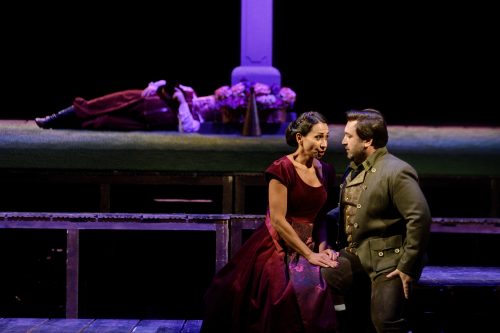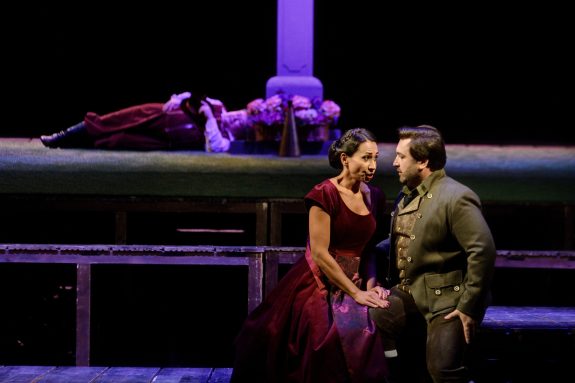 Czech Republic Smetana, The Secret (Tajemství): Soloists, Choir and Orchestra of the National Moravian-Silesian Theatre / Jakub Klecker (conductor). Antonín Dvořák Theatre, Ostrava, 8.3.2024. (GT)
Czech Republic Smetana, The Secret (Tajemství): Soloists, Choir and Orchestra of the National Moravian-Silesian Theatre / Jakub Klecker (conductor). Antonín Dvořák Theatre, Ostrava, 8.3.2024. (GT)

Production:
Stage director – Tomáš Studený
Set designer – David Janošek
Costume designer – Eva Jiřikovská
Motion cooperation – Ladislava Košíková
Chorus master – Jurij Galatenko
Dramaturg – Juraj Bajús, Eva Františáková
Cast:
Malina – Martin Gurbaľ
Kalina – Martin Bárta
Panna Róza – Anna Nitrová
Blaženka – Soňa Godarská
Vít – Richard Samek
Bonifác – Josef Škarka
Skřivánek – Martin Javorský
The Bricklayer – Jakub Tolaš
The Innkeeper – Ivana Ambrúsová
Jirka – Aleš Burda
The Ghost of Friar Barnabáš – Roman Vlkovič
Bagpipe player – Jiří Dvořák
Bedřich Smetana’s seventh and penultimate completed opera is often referred as among his operatic masterpieces. After the extraordinary success of The Kiss (review here), the libretto is again by Eliška Krásnohorská, who Smetana trusted so much that he offered a limitless role to the poet for The Secret – yet she never accepted a fee for any of her librettos. There was a clever element of marketing by the composer calling it ‘The Secret’ – steering music lovers to speculate as to what the secret is, rather than using its original name ‘the treasure’. The composer also mischievously added to the text the mention of 1200 gulden that Smetana was owed by the Prague Provisional Opera Theatre at the time, and here the Alderman Kalina owes the bricklayer 1200 gulden, which is mentioned twice in the opera. The librettist based her plot on the rivalry between the Kalinas and Malinas families, somewhat reminiscent of the feud between the Capulets and the Montagues. Unlike Shakespeare’s Romeo and Juliet, the story has an almost fairy-tale ending.
Krásnohorská’s narrative was influenced by La Fontaine’s fable Les Femmes et la Secret in its portrayal of Bohemian village life with the trivial quarrelling between the two Aldermen (the name Kalina means ‘snowdrop’, and Malina means ‘raspberry’), and heightened because their children fall in love yet cannot marry without parental approval so they keep it a secret. Smetana drew on the libretto as a canvas to portray the distinctive characters of the environment in which he lived. Another stimulus was the motif of love blossoming into maturity and the overcoming of life’s obstacles. The secondary plot is one of Kalina’s greed and his wounded pride, while the villagers are portrayed as comically vain, often intoxicated, amorous and gossipy.
This production of The Secret first saw the light of day on 27 April 2017 at the Antonín Dvořák Theatre in Ostrava. The opera is set in Bĕlá, a village near Bezděz Castle, in the late-eighteenth century (near a village where the composer lived). Before the overture to Act I, Kalina and Malina run across the stage fighting with each other, and one throws down a bunch of flowers. The richly embroidered overture – based on several motifs – one revealing the secret treasure, another for Kalina, there is a fully worked fugue, and a small musical motif akin to the aria ‘Song to the Moon’ from Dvořák’s Rusalka. Dvořák played the viola in the orchestra which gave the premiere of The Secret.
The curtains opened with the villagers singing a glorious chorus celebrating the harvest ‘Zitko beautiful, the bread’. An element of realism in Smetana’s score are the use of wooden blocks in the orchestra depicting the peasants’ threshing. The retired old soldier Bonifác makes advances to Róza, who rejects him, recalling that her family rejected Kalina because he was poor, and Bonifác accuses Róza of still loving Kalina, yet she claims he betrayed her by marrying someone else.
The Aldermen Kalina and Malina enter, and Kalina is informed by his bricklayer that he owes 1200 gulden for his new house, yet there erupts a quarrel among the villagers who support either Kalina or Malina – which is halted by the Troubadour Skřivánek, who sings a lovely ballad ‘Yesterday was Sunday’ accompanying his singing with a guitar. His song implies a settling of the dispute between Malina and Kalina, yet Kalina’s debt leads to a fresh clash with Malina. A bagpiper plays a Bohemian folk melody and the villagers dance a vividly depicted polka, however, the angry Kalina throws him to the ground. To stop the fighting, Kalina’s son Vít and Malina’s daughter Blaženka calm their parents and take them away. A letter by the deceased Friar Barnabáš is discovered by Bonifác which mentions a secret treasure that could resolve Kalina’s financial woes. Kalina tells Vít and Bonifác to keep it secret, yet the old soldier tells his friends about it. Smetana’s orchestral score reprises very subtly a theme From Bohemia’s Woods and Fields when Vít and Blaženka steal a kiss in the moonlight and the moment is interrupted by Skřivánek who mischievously announces their secret through his speaking trumpet just to ensure everyone knows about it.
In Act II, Kalina takes measures to obtain the treasure singing of his dire plight, ‘I am a beggar! The ears in debt’ and his desire for gold and thus win over his old love Róza, he falls asleep, and we see in his dream the procession of ghosts from the past, including Friar Barnabáš. The apparitions sing that he should look for the treasure, yet he is warned that he can lose his soul and go to hell: ‘Mother of God, graciously show us your face!’ Shocked by his nightmare, Kalina awakes and starts praying: ‘That pretty spectacle!’ The young lovers Vít and Blaženka meet, and she tells him to keep their love a secret and they are overheard by old Bonifác, who in another comic moment now tells all and sundry of their secret love. A highlight is the aria by Róza, who still loves Kalina, and old Bonifác tells Róza that he still loves her, but now she rejects him, and now Kalina is discovered digging for the treasure disappearing into a secret tunnel and Róza tries to stop him.
In Act III, the villagers are cutting the hops ‘We are happy and cheerful!’ and ask Blaženka to sing for them, yet her aria ‘Are the hillsides above the waterfalls’ reflects her sadness, and now the disturbed villagers beg Malina to let her marry Vít. But Malina demands that her father Kalina asks for her hand, yet he cannot be found. Bonifác says Kalina is gone for good, and foolishly he talks about the hidden treasure, and that no one should tell anyone about it. In despair, Vít now says that he will go away and return in a year and prove a worthy husband to Blaženka. The villagers now debate the marriage between Vít and Blaženka, yet suddenly loud bangs are heard as Kalina emerges from a chimney and announces that he has renounced the treasure because he loves Róza and the marriage between Vít and Blaženka is permitted and all ends happily.
Much of the plot is difficult to follow – often resembling a Marx Brothers farce – yet the thread running through is a comedy of petty greed and ambition over love and virtue. The opera is ornamented with charming arias, duets, choruses and ensemble pieces which move swiftly and keep the audience’s attention.

Of the singers, the Blaženka of Sona Godarská was the outstanding vocal star although her character was not so well defined as in her previous portrayal in The Two Widows (review here), and many of Smetana’s characters in The Secret are not so convincing, yet Godarská’s sophisticated soprano was a high spot, as was the Róza by Anna Nitrová whose contralto was finely characterised from being a betrayed lover to her transformed feelings for Kalina. Of the male characters, the Kalina of Martin Barta was terrific in bringing out every ounce in his mixing childish vanity with frantic gluttony, and only the Bonifác of Josef Škarka approached his level of characterisation. Richard Samek and Martin Gurbaľ had less to work with as Vít and Malina – the magnificent chorus was outstanding and complemented the amusing moments on stage.
The orchestra was splendidly directed by Jakub Klecker and once again the ensemble clearly has many distinguished virtuoso musicians, especially in the woodwinds. Tomáš Studeny’s staging was outstanding evincing all the brilliance of Smetana’s comic opera, the choreography of the fighting was well managed by Ladislava Košíková, and together with the colourful costumes by Eva Jiřikovská – ranging from pinks and green colours against the flowery pastoral milieu of David Janošek’s set – there was a beautifully countrified imagery throughout and making this another triumphant success for Ostrava in their week-long celebration of the composer’s anniversary.
Gregor Tassie
